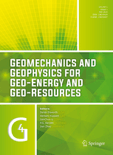
Geomechanics and Geophysics for Geo-Energy and Geo-Resources
Scope & Guideline
Pioneering research in geo-resources and energy efficiency.
Introduction
Aims and Scopes
- Geomechanical Behavior of Geological Materials:
The journal covers the study of how geological materials respond to different stress and strain conditions, including aspects of failure mechanisms, strength characteristics, and the influence of environmental factors. - Hydraulic Fracturing and Reservoir Management:
Research articles focus on hydraulic fracturing techniques, reservoir characterization, and management strategies, especially in the context of unconventional resources like shale gas and tight oil. - Thermal and Hydro-Mechanical Interactions:
A significant area of research involves the interactions between thermal processes and hydraulic behaviors in geological formations, particularly relevant to geothermal energy and CO2 sequestration. - Innovative Experimental and Numerical Techniques:
The journal emphasizes the development and application of advanced experimental setups and numerical modeling techniques to simulate geomechanical phenomena, enhancing the understanding of complex geological processes. - Environmental and Safety Considerations:
Research addressing the environmental impacts of geomechanical processes and the safety implications of mining and energy extraction operations is a core focus area.
Trending and Emerging
- Machine Learning and Data-Driven Approaches:
There is a noticeable increase in research utilizing machine learning and data-driven methodologies for predicting geological behaviors and optimizing resource extraction processes. - Sustainable Resource Management:
Research focusing on sustainable practices in resource management, including CO2 sequestration and energy-efficient mining methods, is becoming increasingly prevalent. - Complex Fluid-Mechanical Interactions:
Studies exploring the interactions between fluids and mechanical properties in geological formations are trending, particularly in relation to hydraulic fracturing and geothermal energy. - Advanced Characterization Techniques:
Emerging technologies for material characterization, including high-resolution imaging and acoustic emission monitoring, are gaining traction, enhancing the understanding of material behavior under stress. - Environmental Impact Assessments:
Research addressing the environmental implications of geomechanical practices, including monitoring and mitigation strategies for induced seismicity and groundwater contamination, is on the rise.
Declining or Waning
- Traditional Mining Techniques:
As the industry evolves towards more innovative and sustainable practices, research focused on traditional mining techniques has decreased, reflecting a shift towards modern methodologies. - Static Analysis Models:
There has been a waning interest in purely static analysis models, as more dynamic and realistic modeling approaches are favored, particularly those that incorporate time-dependent behaviors. - Low-Enthalpy Geothermal Studies:
Research on low-enthalpy geothermal systems appears to be diminishing, potentially overshadowed by more pressing studies on high-temperature geothermal applications. - Basic Rock Mechanics:
Basic studies in rock mechanics, which do not incorporate advanced techniques or applications, are less frequently published, as the focus shifts to more applied and interdisciplinary research.
Similar Journals
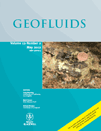
GEOFLUIDS
Unlocking the Secrets of Fluid Dynamics in NatureGEOFLUIDS, published by WILEY-HINDAWI, is an esteemed open-access journal dedicated to advancing the field of Earth and Planetary Sciences since its inception in 2001. With an ISSN of 1468-8115 and E-ISSN 1468-8123, the journal has become increasingly accessible, allowing for broader dissemination of research findings since adopting an open-access model in 2017. The journal has established itself within the academic community, achieving a Scopus rank of #86 in the domain of General Earth and Planetary Sciences, placing it in the 56th percentile, and garnering a Q3 category classification as of 2023. GEOFLUIDS serves as a platform for interdisciplinary exchange of ideas and findings—encouraging contributions that explore fluid dynamics in geological systems and their implications for natural resources and environmental management. Researchers, professionals, and students alike are invited to contribute to and engage with the latest research in this growing field, further enhancing the journal's role in shaping the future of Earth science research.
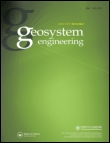
Geosystem Engineering
Exploring innovative approaches in environmental engineering.Geosystem Engineering, published by Taylor & Francis Ltd, is a prominent academic journal focusing on the interdisciplinary fields of Environmental Engineering, Pollution, and Waste Management and Disposal. With an ISSN of 1226-9328 and an E-ISSN of 2166-3394, this journal has been a significant contributor to the scholarly discussions since its inception in 1998 and continues to publish impactful research up to 2024. As a recognized journal within the Q3 category for its respective fields as of 2023, it serves as a vital platform for researchers, professionals, and students aiming to disseminate findings, share innovations, and address pressing environmental challenges. Although it does not currently offer Open Access options, Geosystem Engineering remains essential for those invested in advancing sustainable practices and technologies in geosystems. The journal delivers critical insights that contribute to the development of policies and practices aimed at improving environmental quality and waste management strategies globally.
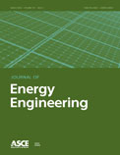
JOURNAL OF ENERGY ENGINEERING
Connecting Ideas for Sustainable Energy PracticesJOURNAL OF ENERGY ENGINEERING, published by the ASCE-Amer Soc Civil Engineers, serves as a pivotal resource in the fields of civil and structural engineering, energy engineering, and nuclear energy research. With an ISSN of 0733-9402 and an E-ISSN of 1943-7897, this esteemed journal demonstrates a consistent commitment to advancing knowledge in energy systems, sustainability, and waste management. Ranking within the second quartile in several categories—including Civil and Structural Engineering and Energy Engineering and Power Technology—this journal maintains a strong reputation, underscored by its Scopus rankings that place it in the top tiers of its discipline. Accessible from 1982 through 2024, the journal provides researchers and professionals meaningful insights through rigorously peer-reviewed articles, critical reviews, and case studies that address contemporary challenges in energy utilization and infrastructure development. Without open access options, it ensures the integrity and credibility of published work, showcasing influential research that contributes to sustainable solutions in energy and environmental frameworks. Researchers, professionals, and students alike will find the JOURNAL OF ENERGY ENGINEERING an indispensable platform for exploration and dissemination of innovative ideas within the realm of energy and engineering.
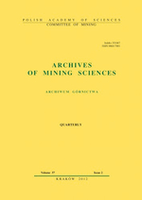
Archives of Mining Sciences
Exploring the depths of geochemical innovation.Archives of Mining Sciences is a peer-reviewed journal published by the Polska Akademia Nauk (Polish Academy of Sciences), dedicated to advancing knowledge in the fields of geochemistry, petrology, geotechnical engineering, and engineering geology. With an ISSN of 0860-7001 and an E-ISSN of 1689-0469, this journal has been a vital resource for professionals and researchers since its inception in 1991. Housed in Poland, the journal serves as a platform for the dissemination of significant research results, technical developments, and case studies, ensuring accessibility to a global audience. Competing in a rigorous landscape, it has achieved a notable Q3 ranking in 2023 within both the Geochemistry and Petrology and Geotechnical Engineering and Engineering Geology categories. As it converges through its years of publication—currently covering the period from 2008 to 2024—the journal maintains a strong focus on fostering innovative research that addresses crucial geological challenges. Its presence in Scopus rankings reinforces its commitment to quality and relevance, making it an essential read for students and professionals seeking to stay at the forefront of mining sciences.

ROCK MECHANICS AND ROCK ENGINEERING
Transforming Geological Insights into Engineering SolutionsROCK MECHANICS AND ROCK ENGINEERING, published by SPRINGER WIEN, stands as a premier journal in the fields of civil and structural engineering, geology, and geotechnical engineering. Since its inception in 1983, this journal has evolved into a leading platform for the dissemination of high-quality research, underscored by its impressive Q1 quartile rankings in multiple relevant categories as of 2023. With a significant impact factor and a ranking of 8th out of 321 in Earth and Planetary Sciences (Geology), the journal attracts scholars and practitioners aiming to contribute to and stay abreast of advancements in rock mechanics and engineering practices. While it does not offer Open Access options, its comprehensive and rigorous peer-reviewed articles serve as essential resources for fostering knowledge and innovation in the sector. The commitment to exploring the interactions between geological materials and engineering applications makes this journal indispensable for researchers, professionals, and students dedicated to pushing the boundaries of these critical fields.

Petroleum Exploration and Development
Pioneering Discoveries in Geology and GeochemistryPetroleum Exploration and Development is a premier open-access journal published by KEAI PUBLISHING LTD, dedicated to advancing the fields of petroleum exploration and extraction as well as associated technologies. Since its inception in 2008, the journal has established itself as a key resource for researchers and professionals across various disciplines, evidenced by its impressive Q1 rankings in multiple categories including Economic Geology and Energy Engineering. With an impact factor that reflects its high citation rates and academic significance, this journal offers a unique platform for disseminating cutting-edge research related to geological studies, geochemistry, and energy sustainability. By making all its content freely accessible, Petroleum Exploration and Development ensures that its findings are available to a global audience, fostering collaboration and innovation within the community. Researchers, industry professionals, and students will find valuable insights and advancements in the realm of petroleum science, making it an essential part of their academic and professional libraries.
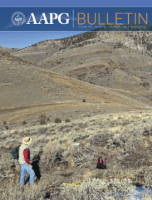
AAPG BULLETIN
Advancing Earth Sciences and Energy Engineering.AAPG BULLETIN, published by the American Association of Petroleum Geologists, stands as a premier journal in the fields of Earth Sciences and Energy Engineering. With an impressive history spanning from 1968 to 2023, the journal has established itself as a valuable resource for researchers and professionals alike, focusing on a wide array of topics including geology, geochemistry, petrology, and fuel technology. Its robust standing in the academic community is reflected in its recognition as a Q1 journal across multiple categories such as Earth and Planetary Sciences, Energy Engineering, and Geology, with notable rankings in prestigious databases like Scopus. Although not an open-access journal, the AAPG BULLETIN provides vital insights and studies that advance our understanding of Earth processes and energy resources. It serves as an essential platform for disseminating cutting-edge research, fostering collaboration, and inspiring the next generation of scientists and engineers in the pursuit of sustainable energy solutions.
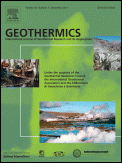
GEOTHERMICS
Exploring innovative solutions in geothermal energy.GEOTHERMICS, published by Pergamon-Elsevier Science Ltd, serves as a leading journal in the fields of geology, geotechnical engineering, and renewable energy sustainability. With an established history dating back to 1970, this journal has evolved to become an essential platform for disseminating innovative research and applications in geothermal energy and related disciplines. Its impressive impact factor and consistent performance in prestigious quartiles—currently ranked Q1 in both Geology and Geotechnical Engineering, along with Q2 in Renewable Energy—underscore its significance in the academic community. Although this journal is not Open Access, it provides readers with valuable insights into current trends, methodologies, and technologies that drive the advancement of geothermal science. Researchers, professionals, and students alike will find GEOTHERMICS to be an invaluable resource, fostering knowledge exchange and collaboration in an increasingly important field for sustainable energy solutions.

Upstream Oil and Gas Technology
Pioneering Research for Sustainable Energy SolutionsUpstream Oil and Gas Technology, published by Elsevier, is a leading journal dedicated to advancing knowledge and innovation in the upstream oil and gas sector. With an ISSN of 2666-2604, this journal offers insightful research articles and critical reviews from 2019 to 2023, creating a valuable repository of knowledge for professionals and academics alike. Strategically positioned in the Q2 quartile of various related fields, including Chemical Engineering, Fuel Technology, and Geophysics, it holds impressive Scopus rankings, such as Rank #30 in Geophysics, demonstrating its significant impact within the scientific community. Although currently not operating under an open access model, the journal remains accessible through institutional subscriptions, ensuring that essential research is readily available to those in the industry. The editorial objectives focus on promoting high-quality research that addresses contemporary challenges in exploration, production, and sustainable practices within the upstream oil and gas domain, making it an invaluable resource for researchers, students, and industry professionals.
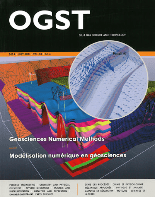
Oil & Gas Science and Technology-Revue d IFP Energies nouvelles
Transforming Knowledge into Energy SolutionsOil & Gas Science and Technology - Revue d'IFP Energies nouvelles, published by EDP SCIENCES S A, is a distinguished journal in the field of energy science, specifically focusing on the latest advancements in oil and gas technologies. Since its transition to Open Access in 1997, the journal has been dedicated to disseminating high-quality research that addresses the challenges and innovations inherent in energy engineering and fuels. With an ISSN of 1294-4475 and an E-ISSN of 1953-8189, this journal holds a significant position in academic circles, reflecting its contributions to sustainable energy solutions. The journal's rankings in Scopus showcase its impact, particularly in the areas of Energy Engineering and Power Technology (Rank #105/224), Chemical Engineering (Rank #131/279), and Fuel Technology (Rank #51/100). As a pivotal resource for researchers, professionals, and students, it aims to foster knowledge exchange and promote innovative technologies essential for the ongoing evolution of the energy sector.